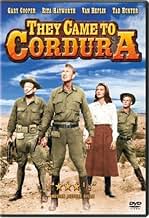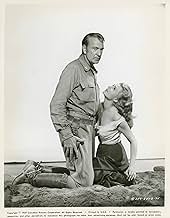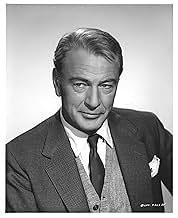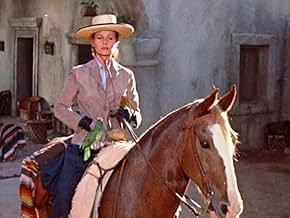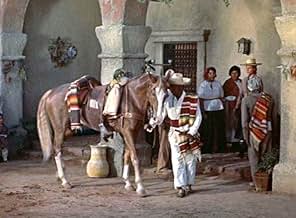IMDb RATING
6.4/10
2.6K
YOUR RATING
An army major, himself guilty of cowardice, is asked to recommend soldiers for the Congressional Medal of Honor during the Mexican Border Incursion of 1916.An army major, himself guilty of cowardice, is asked to recommend soldiers for the Congressional Medal of Honor during the Mexican Border Incursion of 1916.An army major, himself guilty of cowardice, is asked to recommend soldiers for the Congressional Medal of Honor during the Mexican Border Incursion of 1916.
- Director
- Writers
- Stars
- Awards
- 1 win & 1 nomination total
Jim Bannon
- Capt. Paltz
- (as James Bannon)
Wendell Hoyt
- Cavalry Trooper
- (uncredited)
- Director
- Writers
- All cast & crew
- Production, box office & more at IMDbPro
6.42.6K
1
2
3
4
5
6
7
8
9
10
Featured reviews
They Came to Cordura
Take Gary Cooper and Rita Hayworth, surround them with a core of actors who are still well-known today, add beautiful scenery, tackle a very interesting philosophical question. What's not to like? As it turns out, there's a lot not to like. Coop's role is to portray a world-weary, duty-bound officer, obsessed with heroism. Diappointingly, "wooden" would best describe his take on the role. Hayworth, as tequila-drinking, cigarette-smoking, comforter-of-America's-enemies is, at times, over the top. She's still got the sexy sizzle she's known for, but the sexual tension between her and the men isn't compelling. The supporting members of the cast are supposed to devolve from heroes to louts, but their hand is tipped so early in the movie, that their later actions are expected--not deplored. It's a dark western that would appear to be yin to "The Magnificent Seven"'s yang. Heroes become brutes--brutes become heroes. The later is a lot more entertaining and--a lot more satisfying.
Wilson's Mexican Misadventure
I have to agree that this is a film that is not as good as it should be. Robert Rossen is a fine director ("All The King's Men", "Alexander The Great", "The Hustler"), but he is not a popular one. His films do tackle weighty themes and characters, but too frequently he gets talky and loses his audience. Such a thing happens in "They Came To Cordura", where the theme of what is courage is overdeveloped. From what one of the earlier comments on this thread suggested Rossen's movie was half an hour longer than it is. Since many viewers lose their interest in the film at it's current length, why would a longer version improve matters?
In 1916, while World War I was occupying most people's attention, President Wilson was concerned with the continuous unsettled state of Mexico, then in the sixth year of it's Revolution. Initially he was delighted with the first head of the Revolution, Francisco Madero, who was trying to make the country a nation ruled by constitutional law. But in 1913, Madero was overthrown and murdered by the head of the Mexican army, General Huerta. Huerta had support by the then Ambassador to Mexico, a gentleman named Henry Wilson (no relation to the then President-elect), who openly cooperated in the assassination. After Woodrow Wilson was inaugurated, he replaced Henry, but the damage was done to Mexican-American relations. The new President was too ham handed to improve matters. In 1914 he had the Marines land at Vera Cruz after our flag had been insulted. Many lives were lost in this battle. Wilson worked to force Huerta out of his office. This brought him into considering someone to replace Huerta.
Why a puritanical prude like Woodrow Wilson thought of supporting Francisco "Pancho" Villa as the corrective to Huerta has never been adequately explained. Although the two men never met, it is inconceivable that Wilson would have found the hard drinking, bloody minded, and woman chasing Pancho as an ideal type to run Mexico. But he did, and for a year or so (until Huerta left Mexico) Villa was given arms and supplies from the U.S. This honeymoon lasted until a new figure arose - General Venusiano Carranza. Carranza (like Madero) wanted the adoption of a permanent national constitution to run the country. Wilson liked this (he did not notice that Carranza did not hesitate to feather his own nest while stressing the constitution. So in 1916 Wilson began aiding Carranza, and slowly ceased assisting Villa.
Villa was angered by this, and decided to teach the gringos a lesson. He raided the town of Columbus, New Mexico, killing about a dozen citizens. It was the first foreign invasion of American soil since the War of 1812, and would be the only invasion of the continental territory of the U.S. between 1814 and 09/11/2001. Wilson was furious, and demanded that President Carranza arrest the bandit/revolutionary. Wilson might as well have demanded that Carranza arrest the winds of Mexico. He had fought several battle against Villa, and knew that Pancho was no pushover. When Carranza gave some half-baked reason for not catching Pancho, Wilson decided to take the matter into his own hands: he sent troops into Mexico under General John J. Pershing to catch the bandit revolutionary. For a year or so Pershing tried to catch Villa, but the wily Pancho managed to keep escaping. Finally the U.S. troops were called back. Mexicans were incensed at American arrogance in invading their country (sound familiar?). The only good thing was that it enabled us to test our army out here, under if's future Expeditionary Commander's leadership, before we went into the European conflict.
Except, possibly, "The Three Amigos", this is the only commercially made film that is set in the Anti - Villa expedition of 1916 - 1917. As such it barely touches the reasons for the expedition. Instead it concentrates on Gary Cooper's assignment to find five men who should receive the U.S. Medal of Honor for gallantry and bravery in action. It is a cynical act by Washington, because 1) the purpose is public relations cosmetics for a botched armed intervention; and 2) Cooper's Major Thorn is actually given the assignment because he acted cowardly on the field of battle. For the Major to be given this quiet assignment is actual an insult - his own courage is being questioned.
Soon he finds a battle going on and picks out his five men (Van Heflin, Richard Conte, Michael Callan, Tab Hunter, and Dick York). This gives him some problems with an old friend, Robert Keith, who planned the attack, and hoped it would lead to him getting the award (actually, Cooper was only impressed at how slapdash and badly planned the attack was, and cannot think of it's architect getting any type of award as a result). Keith ends his friendship with Cooper as a result.
Taking his five men with him, Cooper starts trying to get to know them. He soon discovers that the men are not interested in the medal, and (as they have a long trek to Cordura, where they have to go to finalize the awards), Cooper learns that the men are not very noble at all. To worsen things, they capture a hacienda owner who is American (Rita Hayworth), who gave assistance to Villa's men. The woman reawakens sexual tensions and rivalries between the five men, as well as Cooper.
The film ends with Cooper and the men coming to turns (after several nearly deadly confrontations) with their own views of the values of true courage and it's being honored. It is not a dull matter, but one questions a full two hour about it. Because of the covering of this dismal incident of the diplomatic history of the U.S. and Mexico, and the acting (all the leads are good), and Rossen's direction - it is worth a "7" out of "10".
In 1916, while World War I was occupying most people's attention, President Wilson was concerned with the continuous unsettled state of Mexico, then in the sixth year of it's Revolution. Initially he was delighted with the first head of the Revolution, Francisco Madero, who was trying to make the country a nation ruled by constitutional law. But in 1913, Madero was overthrown and murdered by the head of the Mexican army, General Huerta. Huerta had support by the then Ambassador to Mexico, a gentleman named Henry Wilson (no relation to the then President-elect), who openly cooperated in the assassination. After Woodrow Wilson was inaugurated, he replaced Henry, but the damage was done to Mexican-American relations. The new President was too ham handed to improve matters. In 1914 he had the Marines land at Vera Cruz after our flag had been insulted. Many lives were lost in this battle. Wilson worked to force Huerta out of his office. This brought him into considering someone to replace Huerta.
Why a puritanical prude like Woodrow Wilson thought of supporting Francisco "Pancho" Villa as the corrective to Huerta has never been adequately explained. Although the two men never met, it is inconceivable that Wilson would have found the hard drinking, bloody minded, and woman chasing Pancho as an ideal type to run Mexico. But he did, and for a year or so (until Huerta left Mexico) Villa was given arms and supplies from the U.S. This honeymoon lasted until a new figure arose - General Venusiano Carranza. Carranza (like Madero) wanted the adoption of a permanent national constitution to run the country. Wilson liked this (he did not notice that Carranza did not hesitate to feather his own nest while stressing the constitution. So in 1916 Wilson began aiding Carranza, and slowly ceased assisting Villa.
Villa was angered by this, and decided to teach the gringos a lesson. He raided the town of Columbus, New Mexico, killing about a dozen citizens. It was the first foreign invasion of American soil since the War of 1812, and would be the only invasion of the continental territory of the U.S. between 1814 and 09/11/2001. Wilson was furious, and demanded that President Carranza arrest the bandit/revolutionary. Wilson might as well have demanded that Carranza arrest the winds of Mexico. He had fought several battle against Villa, and knew that Pancho was no pushover. When Carranza gave some half-baked reason for not catching Pancho, Wilson decided to take the matter into his own hands: he sent troops into Mexico under General John J. Pershing to catch the bandit revolutionary. For a year or so Pershing tried to catch Villa, but the wily Pancho managed to keep escaping. Finally the U.S. troops were called back. Mexicans were incensed at American arrogance in invading their country (sound familiar?). The only good thing was that it enabled us to test our army out here, under if's future Expeditionary Commander's leadership, before we went into the European conflict.
Except, possibly, "The Three Amigos", this is the only commercially made film that is set in the Anti - Villa expedition of 1916 - 1917. As such it barely touches the reasons for the expedition. Instead it concentrates on Gary Cooper's assignment to find five men who should receive the U.S. Medal of Honor for gallantry and bravery in action. It is a cynical act by Washington, because 1) the purpose is public relations cosmetics for a botched armed intervention; and 2) Cooper's Major Thorn is actually given the assignment because he acted cowardly on the field of battle. For the Major to be given this quiet assignment is actual an insult - his own courage is being questioned.
Soon he finds a battle going on and picks out his five men (Van Heflin, Richard Conte, Michael Callan, Tab Hunter, and Dick York). This gives him some problems with an old friend, Robert Keith, who planned the attack, and hoped it would lead to him getting the award (actually, Cooper was only impressed at how slapdash and badly planned the attack was, and cannot think of it's architect getting any type of award as a result). Keith ends his friendship with Cooper as a result.
Taking his five men with him, Cooper starts trying to get to know them. He soon discovers that the men are not interested in the medal, and (as they have a long trek to Cordura, where they have to go to finalize the awards), Cooper learns that the men are not very noble at all. To worsen things, they capture a hacienda owner who is American (Rita Hayworth), who gave assistance to Villa's men. The woman reawakens sexual tensions and rivalries between the five men, as well as Cooper.
The film ends with Cooper and the men coming to turns (after several nearly deadly confrontations) with their own views of the values of true courage and it's being honored. It is not a dull matter, but one questions a full two hour about it. Because of the covering of this dismal incident of the diplomatic history of the U.S. and Mexico, and the acting (all the leads are good), and Rossen's direction - it is worth a "7" out of "10".
A good film with a very subtle message
I would like to add another comment from a little different viewpoint than what has been expressed at IMDb so far. A little film history first- this movie appeared in 1959 and was based on a book with the same title that had come out about a year earlier. Now, in this era (late 1950s) the Westerns ruled TV as well as the movies. It was the popular genre at the time. Also popular at the time were "war movies" that depicted United States troops in action in WWII. That war was pretty recent in memory then and had been quite popular and, of course, a lot of people still remembered our involvement and victory in the first fracas in 1917-1918. Now, how could an author tie in our military's achievements in the World Wars with the Old West? The World Wars were fought in Europe and Asia (Atlantic and Pacific for you Navy people) and neither had any real connection with the American West. The best that anybody could do to link up the two popular genres was to bring up the expedition in 1916 that sent the Army under General Pershing into the country of Mexico to hunt down or at least slow down the various Mexican rebel factions such as the one under Pancho Villa. This is the one time in history that, by any stretch of the imagination, the modern U.S. military was involved in a part of the "Old West". In this time, the "Old West" still lived in Mexico in 1916 plus the fact the U.S. military still used mounted calvary; though they were not going to take them to Europe the next year. However, the U.S. military did take General Pershing and Capts Douglas McArthur and George Patton to Europe the next year so yes, in a way the WWI (perhaps even the WWII) military did fight in the Old West due to this military expedition. Hence the linkage; and why this time and military action gets a disproportionate amount of attention in movies and TV to this date. The trouble with this premise of the Old West calvary in Mexico is that you have people acting in a way that is simply not believable for that era. The plot is very suspicious. You have five men who find they are going to be submitted for the Medal of Honor- an award that was quite well known even then. Perhaps one or even two of the men might not want the award and could conceivably threaten the nominating officer, but that is highly unlikely. Some men, in the past, have not wanted to be awarded the medal but usually because they sincerely felt they did not perform any action that any other man in their unit would not have done. And even when an individual truly did not want the medal, they never threaten the life of a superior officer. To have five men (one of them an officer) nominated for that most illustrious of medals, gang up on the nominating officer is simply so far fetched that only Hollywood could have even conceived of it. In real life, Captain McArthur was nominated for the medal for his actions in Mexico. He did not receive it due to some political reasons; nevertheless the fact remains that he did not threaten the nominating officer. This, by itself, destroys the entire believability of the character of "Lt William Fowler" in this movie. The rest of the characters are equally unbelievable in the context of the movie- the "act of cowardice" of Maj Thomas Thorn (sorry, but Gary Cooper was just a little too old to portray even a passed over Major) was hardly cowardice but simply proper tactics- take cover until you find out where the enemy fire is coming from. If you can't find it or do not have the proper weapon then stay put. Don't get killed unnecessarily. In fact, the proper response of Maj Thorn to Cpl Milo Trubee, when Trubee threatened to blackmail him, would have been something of the nature of "up yours Trubee" as Trubee hardly had anything to blackmail the Major with. Actually, this movie used the military only because of the high respect in society the military had in the 1950s (and does again today, in fact); hence the more dramatic juxtaposition. Now, having wrote all that- let me explain the true moral of this movie and why I like it so much. The military has high respect in society even though, by and large, the military performs duties that are dirty and hard work. In fact, military duty can be depressingly boring and monotonous. Now, in other parts of society there are people who are doing jobs that are at least equally dirty and hard, boring and monotonous. Unlike the military, those people generally do not get much respect from society. For some reason the upper class (and I am in that group) tends to ignore or turn their backs to the lower class workers. And, then, we wonder why this group of people will act belligerent and tough. Well, they may already be that way. Yet, I have seen decent people turn bad due to the disrespect given to them by others. I do not like to see that occur even though I cannot say that I myself have not been disrespectful in the past to people on the "fringe" of society. This movie, by using military personnel in a proxy manner, explores this deeper issue; basically, are there heroes or at least potential heroes amongst the people that we usually ignore? The thoughtful exploration of that question redeems the error in the movie that I previously mentioned. It is a good movie; I recommend that everybody watch it at least once when they are young as it explores the human psyche in much the same way that Major Thorn does.
faux flaws?
This is in response to comments on 'They Came to Cordura' regarding its dramatic weakness and flawed camera work and editing.
The flaws may be real, but they might not be the fault of the filmmaker (writer-director Robert Rossen).
Reportly, the film was taken out of Rossen's hands by the studio and drastically cut and re-cut. The director's original version, about 1/2 hour longer, was apparently much better, making much more dramatic sense.
Further, the movie was shot in CinemaScope, and comments on its poor cinematography and editing are likely based on viewing a crude pan & scan video copy. Such artificial flaws are common with panned & scanned widescreen movies.
.
The flaws may be real, but they might not be the fault of the filmmaker (writer-director Robert Rossen).
Reportly, the film was taken out of Rossen's hands by the studio and drastically cut and re-cut. The director's original version, about 1/2 hour longer, was apparently much better, making much more dramatic sense.
Further, the movie was shot in CinemaScope, and comments on its poor cinematography and editing are likely based on viewing a crude pan & scan video copy. Such artificial flaws are common with panned & scanned widescreen movies.
.
Imperfect, overlong and superficially wordy but still an interesting story
Angered by the US President Wilson's increasing support the rising Mexican political leader General Carranaza, the former US darling Francisco Villa sends his group of rebels to raid a town in New Mexico before coming back over the border. Enraged by the audacity of the man, Wilson orders his troops across the border to catch and/or kill Villa. Part of the group he sends is Major Thomas Thorn, who has been given the job of assessing the men for possible awards a comfortable job given to him by Colonel Rogers, a friend of his father. Fascinated by the nature of heroes, Thorn finds himself given command of a small group of them when he refuses to put Rogers forward for a citation. Thorn is keen to get to know more of the men but, with a captured woman in tow, the men are not as simple as their proposed medals would suggest.
Despite pretty much ignoring the interesting history that serves as a backdrop to this film, this is actually still quite an interesting film that was a lot rawer than I expected it to be, given the period in which it was made. In the early stages it was too basic and I worried that the whole thing would be as clunky as Thorn's early questioning of some of his "heroes", but gradually it got better as it went on and simple lines such as hero and coward were eroded away. This is not to say it is brilliant because it most certainly is not but it is certainly interesting for what it tries to do. It doesn't help that the script really labours the surface but lacks the ability to go significantly deep to really make an impact. However even with this, it was still interesting enough to hold me and I did enjoy the solid if simplistic moral debate that it delivered.
Rossen and his cinematography do great work with the wide-open landscapes but the former must also carry the can for not bringing more emotion out of the script consistently. As a result the cast do well without really excelling with nobody guiding them deeper, this is really what I could have expected. Cooper is as solid as usual with what I suppose was a brave role for him to take. He deals with it well but perhaps wasn't good enough to really convince in layers although he is superficially good enough. Hayworth doesn't have that great a character and her delivery occasionally gets a bit too over-the-top when asked to deliver more emotionally charged material, she has impact but I was looking for more pain and fear. The support cast work well with what they have been given to do. Conte, Heflin, Keith and Hunter are among those giving solid turns in support of Cooper and the raw story.
Overall then this is not a great film but it is an interesting one. Despite being over 45 years old it is surprising raw and willing to turn away from the simple lines of courageous and cowardly towards something that is much realer and well conceived. It doesn't go deep enough but it is strong on the surface could easily have been tighter and dropped 20-30 minutes from the running time but is still worth a look for what it does do well.
Despite pretty much ignoring the interesting history that serves as a backdrop to this film, this is actually still quite an interesting film that was a lot rawer than I expected it to be, given the period in which it was made. In the early stages it was too basic and I worried that the whole thing would be as clunky as Thorn's early questioning of some of his "heroes", but gradually it got better as it went on and simple lines such as hero and coward were eroded away. This is not to say it is brilliant because it most certainly is not but it is certainly interesting for what it tries to do. It doesn't help that the script really labours the surface but lacks the ability to go significantly deep to really make an impact. However even with this, it was still interesting enough to hold me and I did enjoy the solid if simplistic moral debate that it delivered.
Rossen and his cinematography do great work with the wide-open landscapes but the former must also carry the can for not bringing more emotion out of the script consistently. As a result the cast do well without really excelling with nobody guiding them deeper, this is really what I could have expected. Cooper is as solid as usual with what I suppose was a brave role for him to take. He deals with it well but perhaps wasn't good enough to really convince in layers although he is superficially good enough. Hayworth doesn't have that great a character and her delivery occasionally gets a bit too over-the-top when asked to deliver more emotionally charged material, she has impact but I was looking for more pain and fear. The support cast work well with what they have been given to do. Conte, Heflin, Keith and Hunter are among those giving solid turns in support of Cooper and the raw story.
Overall then this is not a great film but it is an interesting one. Despite being over 45 years old it is surprising raw and willing to turn away from the simple lines of courageous and cowardly towards something that is much realer and well conceived. It doesn't go deep enough but it is strong on the surface could easily have been tighter and dropped 20-30 minutes from the running time but is still worth a look for what it does do well.
Did you know
- TriviaAlthough Gary Cooper was 57, his character Major Thorn was forty years old according to the novel. Early in the film it is mentioned that Thorn's father had recently been killed while still on active service.
- GoofsMajor Thorn improperly salutes Colonel DeRose in the opening scene when he is dismissed. He should have saluted and held his salute until it was acknowledged. Instead, he lowers his arm even before Colonel Rose acknowledges it.
- Quotes
Major Thomas Thorn: Did you ever see the Medal of Honor?
Private Renziehausen: No, Sir.
Major Thomas Thorn: It's the most beautiful decoration of all, as it should be. I'd trade an ear for one any time, two in fact.
Private Renziehausen: Excuse me, Sir, but I'd rather have the ear.
- Crazy creditsOpening credits prologue:
On the night of March 8th, 1916, a large mounted force of Mexican rebels under Pancho Villa crossed the American Border and attacked the town of Columbus, New Mexico, killing and wounding both American civilians and soldiers.
As a result of this action,the United States Army sent an expedition into Mexico with orders to capture Villa and disperse his forces.
It was during this campaign that one man, an United States Army officer,was forced to come face to face with two of the great fundamental questions that affect mankind:
What Is Courage? What Is Cowardice?
This is the story of his search for an answer.
- ConnectionsFeatured in Stars of the Silver Screen: Rita Hayworth (2011)
- How long is They Came to Cordura?Powered by Alexa
Details
Box office
- Budget
- $4,000,000 (estimated)
- Runtime
- 2h 3m(123 min)
- Color
- Aspect ratio
- 2.35 : 1
Contribute to this page
Suggest an edit or add missing content



